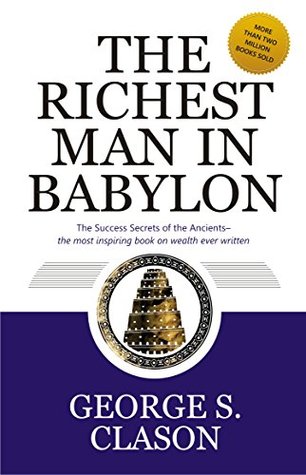Highlights from The Richest Man In Babylon by George S. Clason

I have read a few personal finance-related books until now. All of them preaches to save, not spend, and invest, and I will be rich. This book is no different, but it does provide a simple base upon which, more modern understanding of finance can be built.
Most of the things described in this book are common knowledge, but many of us tend to overlook them. I liked the simple and lucid way in which the author has tried to explain critical financial concepts. Although, I had some difficulty in understanding the archaic English language as it was the first time I came across this variant of English.
This book covers fundamental financial concepts which the inhabitants of Babylon used some 8000 years ago. Below are some of the notes that I prepared while reading the book.
If I were to write the advice of this book in one sentence, it would be save the money, control the expenditures, invest your money wisely, guard your money against losing, insure a future income and increase your ability to earn.
Following are my detailed notes for each of these topics -
- Save money -
- The basic idea here is to save at least one-tenth of your earnings.
- Learn to live with less than you earn. Control your desires.
- Control the expenditures -
- Our necessary expenses will always grow to equal our income unless we protest to the contrary.
- If you want to control your urge to spend, budgeting is an excellent tool. Budget expenses required for your day to day living, to pay for all your enjoyments, and to gratify your worthwhile desires.
- Invest your savings -
- The first rule of investment says that always save the principal from loss.
- Ask those who are experts in handling money for advice to secure your savings from the risky venture.
- Do not get misled by your romantic desires about making wealth rapidly.
- Own your own house (this is controversial)
- Ensure a future income -
- Think about the uncertain future and provide in advance for your old age and the needs of your family.
- Increase your ability to earn -
- Show more interest in your work, more concentration upon your task, and more persistence in your efforts.
- The more one knows about his craft; more will be the reward.
- Seize the opportunities -
- Do not procrastinate.
- It is necessary to take advantage of opportunities to attract good luck.
- Action will lead you to success.
- Better a little caution than a great regret -
- If you desire to help a friend, do so in a way that will not bring your friend's burden upon you.
- Safe loans are those where possessions are more than what is desired.
Notes
Some of the quotes from the book which I liked -
- Advice is one thing that is freely given away, but watch that you only take what is worth having.
- If you desire to help thy friend, do so in a way that will not bring thy friend's burdens upon thyself.
- Learning was of two kinds: the one being the things we learned and knew, and the other being the training that taught us how to find out what we did not know?
- The hungrier one becomes, the clearer one's mind works— also the more sensitive one becomes to the odors of food.
- As for time, all men have it in abundance.
- Where the determination is, the way can be found.
- 'A part of all I earn is mine to keep.' - say it in the morning when you first arise. Say it at noon. Say it at night. Say it each hour of every day. Say it to yourself until the words stand out like letters of fire across the sky.
- Work, well-done, does good to the man who does it. It makes him a better man.
- Proper preparation is the key to our success. Our acts can be no wiser than our thoughts. Our thinking can be no wiser than our understanding.
- Men of action are favored by the goddess of good luck.
- Opportunity is a haughty goddess who wastes no time with those who are unprepared.
- Desires must be simple and definite. They defeat their own purpose should they be too many, too confusing, or beyond a man's training to accomplish.
- One may not condemn a man for succeeding because he knows how. Neither may one with justice take away from a man what he has fairly earned, to give to men of less ability.
- That what each of us calls our necessary expenses will always grow to equal our incomes unless we protest to the contrary.
- Better a little caution than a great regret.
- Our wise acts accompany us through life to please us and to help us. Just as surely, our unwise acts follow us to plague and torment us.
- Life is hard and there will always be some who cannot adjust themselves to it.
-
I did not mark anything in this book.